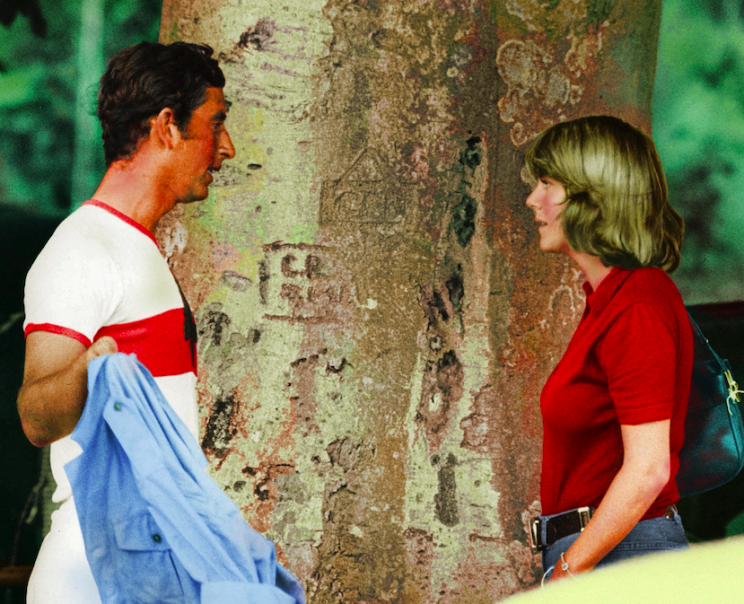Revealed: The phone call from Camilla that ‘led to the end of Charles and Diana's marriage’

A phone call from Camilla to Prince Charles set in motion the chain of events that led to the end of his marriage to Princess Diana, it has been claimed.
A new book about Camilla, the Duchess of Cornwall, says she telephoned Charles in 1986 at the behest of friends worried about his mental state as his marriage crumbled.
The Duchess: The Untold Story, written by royal biographer by Penny Junor, is published later this week and is being serialised in the Daily Mail.
Ms Junor writes that the then Camilla Parker Bowles called Charles at the request of friends when his spirits were low.
The author describes it as the ‘fateful phone call’.
She wrote: ‘And so Camilla phoned him.

‘Camilla was flattered, as anyone would be, to be told that she was the only person who might be able to lift his spirits, but it was true.
‘What he needed was someone who was on his side, who understood him, liked him, loved him even, who wouldn’t make demands or be moody or temperamental, who was kind and warm, who would make him feel safe, boost his morale, restore his confidence and make him laugh again.’
MORE: Princess Diana ‘tried to cut her wrists’ just weeks after wedding to Charles, secret tapes reveal
MORE: Princess Diana ‘threw herself down the stairs’ while four months pregnant with William
Ms Junor writes that Charles was ‘exhausted from five years of trying to handle Diana’s distress, saddened beyond belief that he should have failed so spectacularly, and dangerously depressed’.
She says that when Camilla phoned him, she ‘was not hoping for a renewal of their romance’ that took place before Charles and Diana were married in 1981.
‘After Camilla made the first move, there were more phone calls between her and Charles,’ she wrote.

‘Then, after a while, he started inviting her to Highgrove — although usually in the company of her husband [Andrew Parker Bowles] or other friends. Diana was never there; by then, the Prince and Princess could hardly bear to be in the same house.
‘Camilla did indeed bring Charles back from the brink and give him the strength to face the world. And, eventually, what had begun as friendship and a sympathetic shoulder to cry on turned into a powerful love affair.
‘Yes, he had always loved Camilla — in the way, perhaps, that we all carry a torch for our first love. But he took his wedding vows seriously, and had never intended to rekindle the affair.
‘And if Camilla hadn’t been asked to make that first phone call, he might never have done so.’
However, Ms Junor is being criticised for her upcoming book, with Twitter users accusing her of carrying out a ‘hit job’ on Princess Diana.
Commenters on the Daily Mail’s website have also attacked the latest extract.
Good lord, this is a misogynistic hit job on Diana. Every crazy, needy lady trope in the world https://t.co/rAc161KbyH pic.twitter.com/93aK4QqvQ2
— Lauren Dobson-Hughes (@ldobsonhughes) June 26, 2017
Holly Bush from Loughborough commented: ‘How can Junor say Diana was paranoid about Camilla? She suspected they were having an affair and they WERE! That’s called trusting your gut instincts and being proved right.’
Another commenter, Valentina from London, wrote: ‘With all due respect for Diana, have some respect for the deceased’.
In the most recent extract, Ms Junor wrote that before she married Charles, Diana was ‘very badly educated, naïve and — by her own admission — immature. She lived in a romantic fantasy world of women’s magazines and Barbara Cartland novels, which could not have been more divorced from reality’.
She wrote: ‘The Prince, however, must take some blame for Diana’s paranoia, because he hadn’t handled things well.
‘Instead of explaining to her at the outset that Camilla was an old girlfriend, he’d presented her as nothing more than a friend.
‘It simply hadn’t occurred to him that Diana needed to know the truth before someone else told her.’
Ms Junor wrote that Princess Diana ‘ranted’ and ‘cried’ and ‘kicked furniture’ for six hours on one occasion, when left alone by Charles.

 Yahoo News
Yahoo News 

